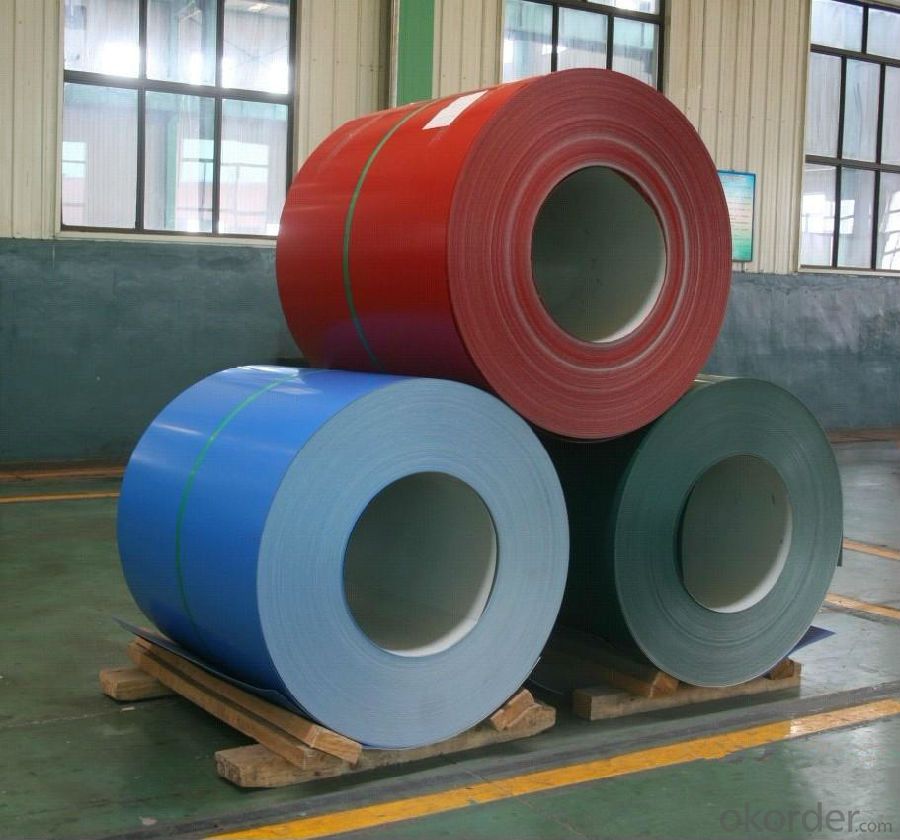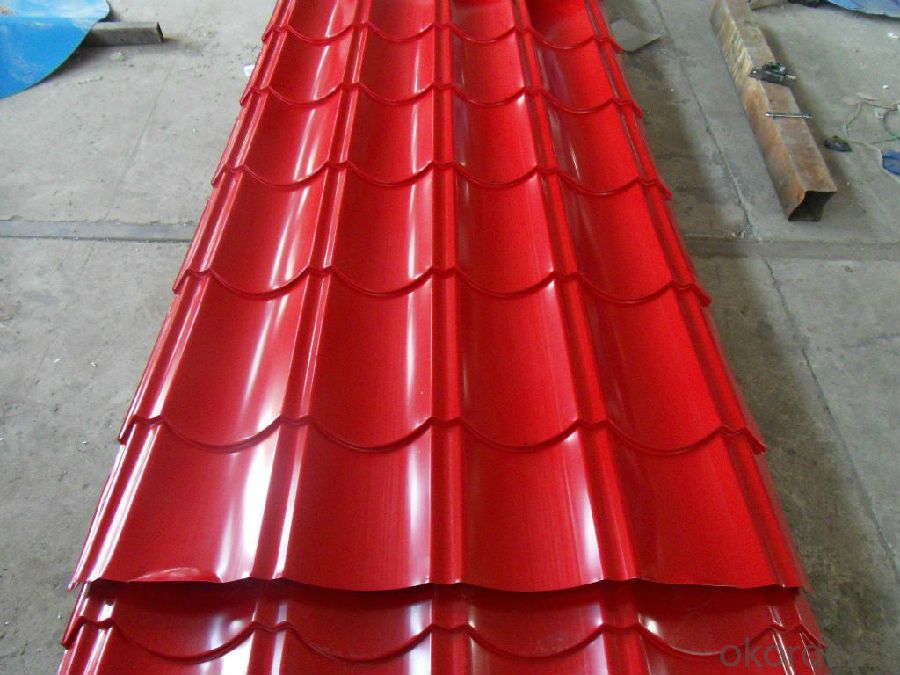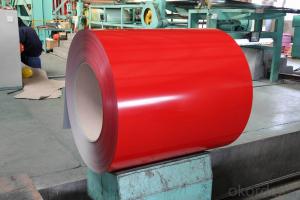Prepainted Galvanized Steel Coil -JIS G3312
- Loading Port:
- China main port
- Payment Terms:
- TT OR LC
- Min Order Qty:
- 50 m.t.
- Supply Capability:
- 10000 m.t./month
OKorder Service Pledge
OKorder Financial Service
You Might Also Like
Prepainted Galvanized Steel Coil -JIS G3312
1. Structure of Prepainted Galvanized steel Coil :
•Prepainted galvanized steel qualified with excellent decorative ,formability ,corrosion resistance ,coating adhesion ,can keep for a long time as well as maintain fresh color .For color coated steel sheet can obtain good economic benefit by steel belt wood ,efficient in construction and save energy ,prevent pollution etc. Which is an ideal material for manufacturing board.
2.Main Features of Prepainted Galvanized steel Coil:
• Excellent process capability
• Workability, durability
• Excellent heat resistance performance
• High strength
• Good formability
3.Prepainted Galvanized steel Coil Images


4.Prepainted Galvanized steel Coil Specification:
Standard: ASTM, GB,JIS,JIS G3302 ASTM 755 EN10169
Grade: DX51D CGCC CS
Thickness: 0.18mm~1.2mm,
Width: 600-1250mm
Coil weight:3-12 MT
5.FAQ of Prepainted Galvanized steel Coi
We have organized several common questions for our clients,may help you sincerely:
1.How long we will receive the goods ?
After receiving your deposit or workable lc ,our normal shipment date is 15-20days,and it takes around 28 days to reach your port of destination. But is up to different destination
2. What is your moq
Normally our moq is 25per size ,but it is up to different size
- Q:I have never owned a non-stainless steel chef's knife and have been looking at some to buy recently, but all of them have various degrees of wear and use. They say that the wear is normal for non-stainless steel knives, but how can I tell if it is too much wear, or if the blade is clean?
- cold rolled steel waers as you carve meat. If the blad if to thin you may want a better one. Utica knife in utica N.Y. made them up to about 10 years ago and i still buy them at auctions.
- Q:How are steel coils used in the production of agricultural trailers?
- Steel coils are used in the production of agricultural trailers to provide strength and durability to the trailer's frame and structure. The coils are typically shaped and welded together to form the trailer's chassis, ensuring it can withstand heavy loads and withstand the rigors of agricultural use.
- Q:Can steel coils be coated with ceramic?
- Yes, steel coils can be coated with ceramic. Ceramic coatings provide a protective layer that enhances the corrosion resistance, heat resistance, and durability of the steel coils. Additionally, ceramic coatings can also offer improved electrical insulation and thermal barrier properties.
- Q:I just bought some cheap earrings from this beauty supply store but they said surgical steel So will they prevent my ears from bleeding / infection ?
- Surgical steel is a grade of steel often used in medical appliances like tweezers, forceps, etc. It's generally non-reactive and considered very safe. It doesn't contain any special properties against infection--you still have to observe basic hygiene and clean your piercings properly--but most people can wear surgical steel earrings without a problem. However, if you have a contact allergy to base metals like nickel, surgical steel may cause redness or irritation because of the metals used in it. If cheap rings or necklaces make your skin break out in a rash you should NOT wear surgical steel.
- Q:What are the different types of steel coil coatings for corrosion resistance?
- Steel coil coatings can be classified into two main types: organic coatings and metallic coatings. 1. Organic coatings are commonly used for steel coil applications due to their excellent corrosion resistance and durability. There are four types of organic coatings: - Polyester coatings: These coatings offer good weatherability and resistance to chemicals, making them suitable for outdoor applications. - PVDF coatings: These coatings are highly resistant to UV radiation, weathering, and chemicals. They provide exceptional durability and are often used in demanding environments such as coastal areas or industrial settings. - Polyurethane coatings: These coatings offer excellent abrasion resistance and a high level of corrosion protection. They are commonly used in applications where there is a higher risk of mechanical damage or exposure to harsh conditions. - Epoxy coatings: These coatings provide excellent adhesion and chemical resistance. They are often used in industrial applications where resistance to chemicals, solvents, and oils is required. 2. Metallic coatings provide effective corrosion protection and can be further divided into two types: - Galvanized coatings: These coatings involve applying a layer of zinc to the steel surface through a hot-dip or electroplating process. This creates a barrier between the steel and the surrounding environment, providing effective corrosion protection. Galvanized coatings are widely used in various industries due to their cost-effectiveness and good durability. - Galvannealed coatings: These coatings are similar to galvanized coatings but undergo an additional heat treatment process. This results in a coating with increased hardness and improved paint adhesion, making it suitable for applications that require additional surface protection or paintability. When selecting the appropriate steel coil coating, it is essential to consider the specific requirements of the application and the level of corrosion resistance needed. Consulting with coating manufacturers or industry experts can help determine the most suitable coating for a particular application.
- Q:What are the common methods of testing the strength of steel coils?
- Common methods of testing the strength of steel coils include tensile testing, hardness testing, and bend testing. Tensile testing involves subjecting the steel coil to tension until it reaches its breaking point. This test measures the maximum amount of force the coil can withstand before it fractures. It provides valuable information about the tensile strength, yield strength, and elongation properties of the steel. Hardness testing is another common method used to determine the strength of steel coils. It measures the resistance of the steel to indentation or scratching. Various methods, such as Rockwell, Brinell, or Vickers tests, are employed to measure the hardness of the steel. Hardness testing provides information about the material's ability to resist deformation or wear. Bend testing is performed to evaluate the ductility and flexibility of the steel coil. In this test, the coil is bent to a specific angle and inspected for signs of cracking or fracturing. Bend testing helps determine the material's ability to withstand bending or forming processes without failure. Other methods of testing the strength of steel coils may include impact testing, where a controlled impact is applied to the coil to assess its resistance to sudden loading conditions, and fatigue testing, which involves subjecting the coil to cyclic loading to determine its endurance limit and potential for failure under repeated stress. It is important to note that the specific testing methods employed may vary depending on the intended application and industry standards. Additionally, non-destructive testing techniques, such as ultrasonic testing or magnetic particle inspection, can be used to detect internal defects or flaws in steel coils without causing damage to the material.
- Q:I am about to do a welding project and we are instructed to only use mild steel. I want to use found objects like coins, spoons, bottle caps, screws, and other small fasteners. Are these mild steel? What other objects can I use that are mild steel?
- Mild steel is what your friends get when they see your mom's cleavage.
- Q:How do steel coils contribute to the renewable energy equipment industry?
- Steel coils play a crucial role in the renewable energy equipment industry by being a key component in the manufacturing of various renewable energy technologies. One of the primary applications of steel coils is in the production of wind turbines. The tower, nacelle, and rotor blades of wind turbines all require steel coils for their construction. In the manufacturing of wind turbine towers, steel coils are used to fabricate the structural components that provide stability and support to the turbine. These coils are typically rolled and welded together to form the tower, ensuring its strength and durability to withstand the forces exerted by the wind. Additionally, steel coils are also used to produce the nacelle, which houses the generator and other essential components of the wind turbine. Moreover, steel coils are used in the production of rotor blades for wind turbines. These blades are responsible for capturing the wind and converting it into rotational energy. Steel coils are used to create the internal structure of the blades, providing the necessary strength and rigidity to withstand the aerodynamic forces. The coils are often combined with composite materials to optimize the performance and efficiency of the blades. Apart from wind turbines, steel coils are also used in other renewable energy technologies such as solar panels. In the manufacturing of solar panels, steel coils are used to create the frames and supporting structures that hold the photovoltaic cells in place. These frames ensure the stability and longevity of the solar panels, allowing them to efficiently capture sunlight and convert it into electricity. Overall, steel coils are vital in the renewable energy equipment industry as they provide the necessary strength, durability, and structural support to various renewable energy technologies. By enabling the production of wind turbines, solar panels, and other renewable energy equipment, steel coils contribute to the expansion and development of the renewable energy sector, thereby advancing the global transition towards cleaner and more sustainable sources of energy.
- Q:melting point, as compare to stainless steel
- Mild steel melting point is 1350-1530°C (2462-2786°F). Stainless steel is 1510°C (2750°F)
- Q:How are steel coils priced and traded in the market?
- Steel coils are typically priced and traded in the market based on various factors such as the current demand and supply, raw material costs, production costs, and market competition. Steel coil pricing often takes into account the specifications of the coil, including its size, thickness, width, and grade. Additionally, market dynamics, such as global economic conditions, trade policies, and currency fluctuations, can also influence steel coil pricing. Traders and buyers negotiate prices based on these factors, and the final price is determined through a combination of supply and demand dynamics and market forces.
1. Manufacturer Overview |
|
|---|---|
| Location | |
| Year Established | |
| Annual Output Value | |
| Main Markets | |
| Company Certifications | |
2. Manufacturer Certificates |
|
|---|---|
| a) Certification Name | |
| Range | |
| Reference | |
| Validity Period | |
3. Manufacturer Capability |
|
|---|---|
| a)Trade Capacity | |
| Nearest Port | |
| Export Percentage | |
| No.of Employees in Trade Department | |
| Language Spoken: | |
| b)Factory Information | |
| Factory Size: | |
| No. of Production Lines | |
| Contract Manufacturing | |
| Product Price Range | |
Send your message to us
Prepainted Galvanized Steel Coil -JIS G3312
- Loading Port:
- China main port
- Payment Terms:
- TT OR LC
- Min Order Qty:
- 50 m.t.
- Supply Capability:
- 10000 m.t./month
OKorder Service Pledge
OKorder Financial Service
Similar products
New products
Hot products
Related keywords





























